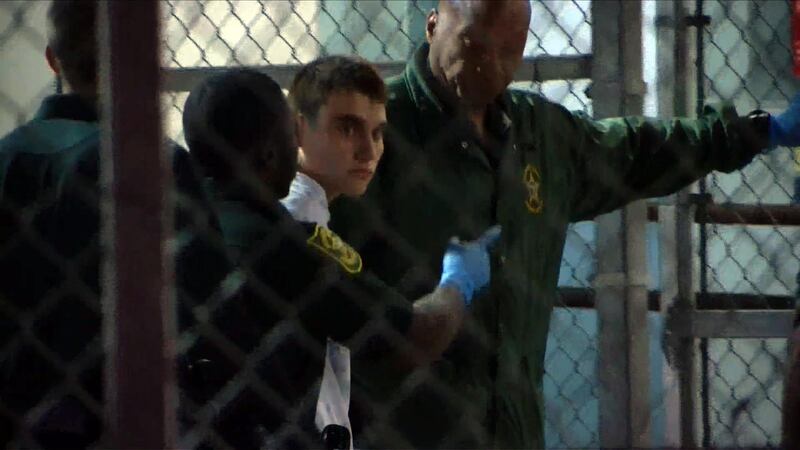The 19-year-old man arrested after a mass shooting at a school in Florida has been charged with 17 counts of murder as authorities faced growing questions about why they failed to act on a string of warning signs.
Nikolas Cruz, 19, was arrested on Wednesday about a mile from the scene of the killings at Marjory Stoneman Douglas High School.
Pupils, staff and neighbours described a troubled young man as it emerged the FBI had been warned about his activities last year.
President Donald Trump consoled the nation in a televised address on Thursday with a message to those affected by the attacks. “We are here for you,” he said.
He also offered a message to children worried about future attacks.
“If you need help turn to a teacher, a family member, a local police officer or a faith leader. Answer hate with love, answer cruelty with kindness,” he said, adding that he planned to visit Parkland, Florida, where the shooting happened.
The killings marked the 18th gun incident at an American school so far this year, according to the advocacy group Everytown for Gun Safety, prompting fresh, familiar calls for tighter restrictions on lethal weapons.
Police said Cruz was a former student at the school. He allegedly returned with a legally owned AR-15 assault rifle, smoke grenades and multiple magazines of ammunition shortly before classes ended.
They described how he set off the fire alarm so that pupils streamed out of classes as he opened fire.
Witnesses said he pursued victims through hallways before fleeing the building along with other pupils amid the chaos.
Students said they had been worried about his behaviour, describing how he posed with weapons for photographs posted on social media.
Read more: What we know so far about Florida school shooting suspect
Dakota Mutchler, 17, said he had once been friends with Cruz.
“He started going after one of my friends, threatening her, and I cut him off from there," he said, adding that Cruz had been expelled from school last year.
Last autumn, a YouTube vlogger warned authorities about comments left on a video.
“I'm going to be a professional school shooter,” said a user named Nikolas Cruz, prompting Ben Bennight to email a screenshot of the comment to the FBI, according to Buzzfeed News.
The FBI said there was not enough information to trace the person behind the comment.
"No other information was included with that comment which would indicate a time location or the true identity of the person who made the comment," FBI Special Agent in Charge Robert Lasky told reporters on Thursday.
Cruz’s father died a few years ago and his mother died in November, said Jim Lewis, a lawyer representing the family with whom Cruz was living.
He brought with him an AR-15 assault rifle when he moved in, he added, and had been treated for depression which the family attributed to his mother’s death.
"They didn't see any danger. They didn't see any kind of predilection this was going to happen," Mr Lewis told CNN.
Aaron Feis, an assistant coach on the school's football team who was shot while shielding students, was the first victim to be publicly identified.
Mr Trump’s address will anger gun control advocates who fear Republicans will shift blame to mental illness.
“We are committed to working with state and local leaders to help secure schools and tackle the difficult issue of mental health,” he said.
He made the same point in an earlier tweet, earning immediate condemnation. A Twitter user believed to be a student at Marjory Stoneman Douglas High School hit back at the president in a message that quickly went viral.
“I don’t want you condolences...” said chaddiedabaddie.
“Multiple of my fellow classmates are dead. Do something instead of sending prayers.
“Prayers won't fix this. But Gun control will prevent it from happening again.”
Melissa Falkowski, a teacher at the school, described how she had shepherded her students into a cupboard as the mayhem unfolded.
“Broward County Schools has prepared us for this situation and to still have so many casualties, at least for me, it's very emotional. Because I feel today that our government, our country has failed us and failed our kids and didn't keep us safe,” she said.
Wednesday’s shooting was the second worst attack at a school in American history, second only to the 26 people shot dead at an elementary school in Newtown, Connecticut in December 2012.
Yet opinion polls suggest momentum is shifting towards the gun lobby. In 1993 Pew found a clear majority in favour of greater gun control – 57 per cent over 35 per cent. In its latest survey, the lead had narrowed to 51 per cent of respondents saying gun control was more important than gun rights compared with 47 per cent who said the opposite.
Iain Overton, director of Action on Armed Violence and author of Gun Baby Gun, said the Second Amendment, guaranteeing the right to bear arms, was too deeply entrenched to allow tougher legislation.
“The Gordian Knot that is the 2nd Amendment - one made up of twisted strands of civil liberty arguments, political financing, healthy profits from an unrestrained firearm industry, and a cultural mantra of the virtues of 'good guys' with guns - means it will take more than a massacre to change the law. It would take a social revolution.”






